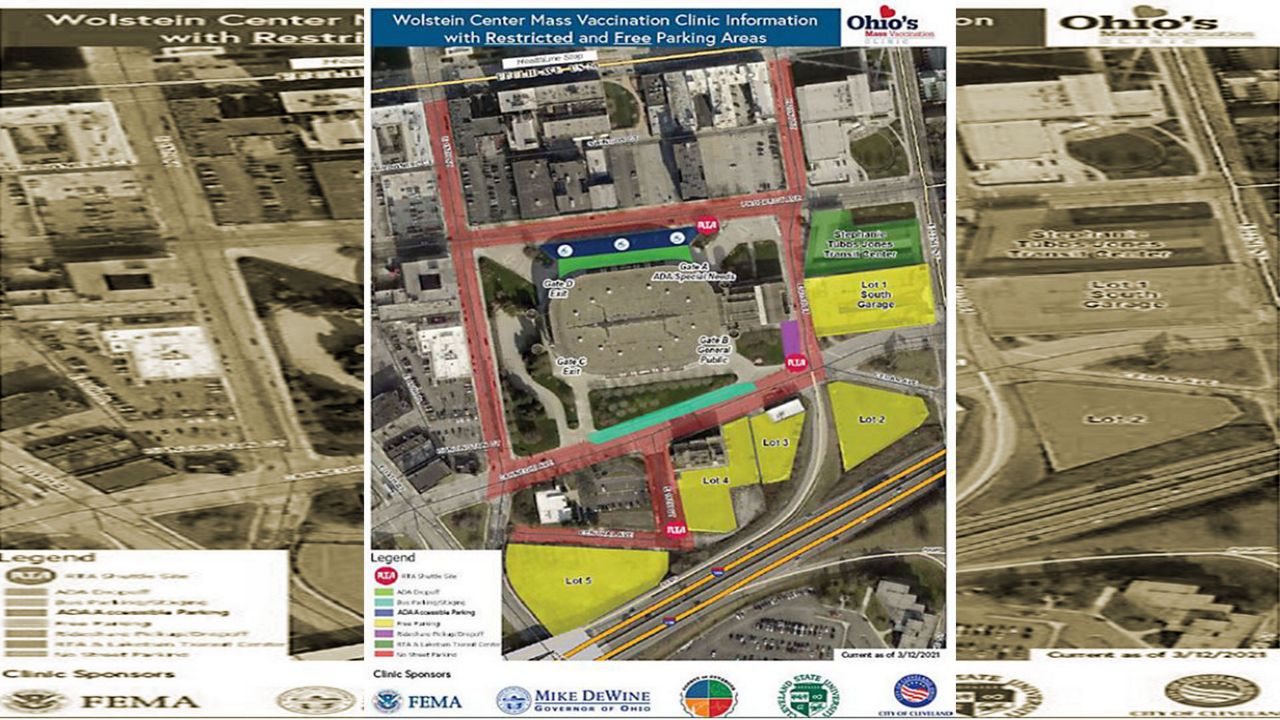CLEVELAND — The state is prepping for rollout of Northeast Ohio’s first non-pop-up mass vaccination clinic at Cleveland State University’s Wolstein Center.
What You Need To Know
- Cleveland State University’s Wolstein Center will open as Northeast Ohio’s first non-pop-up mass vaccination clinic on March 17, following a soft launch on Tuesday
- Ohioans who want an appointment at the Wolstein Center clinic can register at Ohio’s online Vaccination Management System
- Gov. Mike DeWine will make a stop there Tuesday to oversee the soft launch, when 1,500 Ohioans in underserved populations will receive the vaccine
- Parking will be free on streets adjacent to the center and in Cleveland State’s parking garages and free public transportation will be offered
The clinic is set to open for scheduled appointments on Wednesday, March 17, with a soft launch on Tuesday attended by Gov. Mike DeWine.
The Wolstein Center clinic is located at 2000 Prospect Ave. in East Cleveland and will be open seven days a week from 8 a.m. to 8 p.m. for eight weeks. Vaccinations will be administered inside the building.
Ohioans who want an appointment at the Wolstein Center clinic, or at one of the 15 mass vaccination clinics soon to open, can register at Ohio’s online Vaccination Management System.
Residents are directed to fill out a short questionnaire to determine eligibility under the state’s phased roll out plan.
Once eligibility is established, residents are directed to select a mass vaccination location. To choose the Wolstein Center, enter the center’s street address, or its 44115 ZIP code, in the search field and select “book appointment on provider website.”
Those who are not eligible can sign up to be notified when they become eligible.
Appointments are filling quickly and cancellations will be posted on the Vaccination Management System at least 48 hours before the appointment time, said Daniel Tierney, a spokesman for DeWine's office.
As of Monday, March 15, appointments are still available from March 25 on.
DeWine plans to visit the Wolstein Center during the soft launch, when 1,500 Ohioans will receive their COVID-19 vaccination. Representatives from FEMA, the Ohio National Guard and Ohio Emergency Management Agency will also be on hand.
People vaccinated during the soft launch are primarily those in underserved populations who were referred by the state’s community partner organizations, such as the Urban League of Greater Cleveland, which DeWine visited Sunday, Tierney said. Some appointments were filled by people who signed up on the Vaccination Management System.
“That's part of our equity plan to try and reach underserved communities, as well as those who are socially vulnerable,” Tierney said. “We're doing those community partners first, because that's how many people in underserved communities get health care information, and sometimes health care services.”
At least 210,000 doses of the two-dose Pfizer vaccine, followed by the one-dose Johnson & Johnson vaccine, will be administered to Ohioans over the eight-weeks the Wolstein Center clinic will be running, he said.
The clinic is expected to have the capacity to vaccinate up to 6,000 people per day, but will begin with fewer appointments, increasing the number of vaccinations incrementally each day, the state said.
The city of Cleveland will offer free parking for residents who attend the clinic. Cleveland State is also offering free parking in its parking garages.
For help registering and to schedule free transportation, Cuyahoga County residents should call 2-1-1. RTA will offer a free all-day RTA bus pass, and will provide free shuttle services to parking lots near the Wolstein Center, the RTA said in a statement.
Cleveland-area residents 60 and older also can access the city’s Senior Transportation Connection by calling 216-265-1489. Seniors can schedule a ride online but must do so three days in advance. First-time users have to register.
Ohio’s additional 15 mass vaccination clinics, which are expected to be open soon, will be operational as long as they are needed, the state said.



